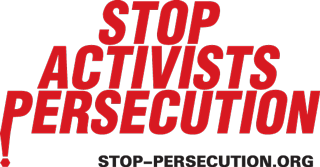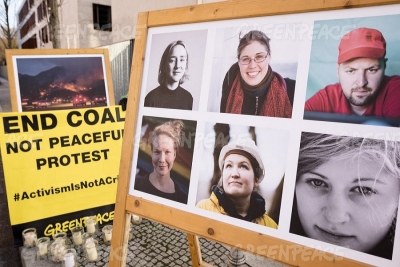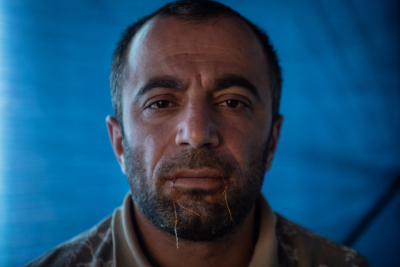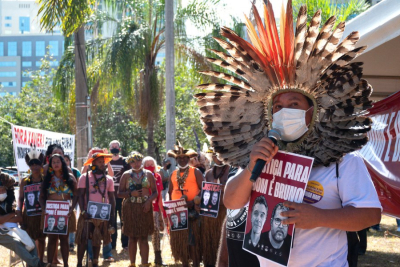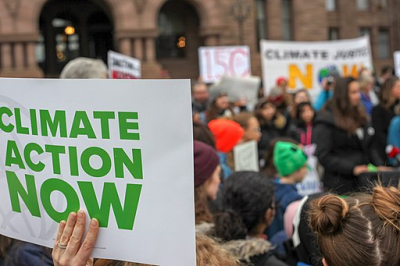The decision to organize a direct non-violent protest came after several years of efforts to stop or limit the operation of the Novaky mine. The activists have negotiated with local mayors, collected and analyzed samples of polluted water (where high concentrations of carcinogenic asbestos were found), and organized public pressure, but nothing has changed.
Unfounded accusation of crime and custody
On the day of their protests, the activists did not break in, they did not damage anything, and they gained admission to the premises through a public entrance, and to the pithead gear via open-access stairs. Soon after the installation of the banner, they were detained, placed in a detention cell, and interrogated. Two days later on November 30, they were accused of the crimes of damaging and endangering the operation of a public facility, a crime that can be punished by up to five years in prison.
The Novaky mine is the property of a private company and there was no damage to it. In other similar cases, this has been considered as no more than a misdemeanour. Moreover, the company was informed about the protest by Greenpeace. Just before the protest, they informed the company representatives that the activity planned was non-violent and that there would be no blockade of the facility. Therefore, the accusation itself was not only unprecedented, but it was followed by even more absurd and unfounded steps on the part of the district prosecutor’s office. On Sunday December 2, the district court in Prievidza refused a bail request and decided that the activists would have to remain in custody until the trial. They were transported to Ilava prison soon after that. According to the judge, the custody was necessary to prevent the activists from continuing their activities. This was rebutted by the Greenpeace office, which emphasized that the activists had been cooperating with the investigators since the very beginning and that they clearly do not present any threat.
"Our activists are not criminals and did not go to the pithead gear to threaten anyone. It is astounding that no one is concerned with a company that has been proved to pollute the environment and has been destroying people's health for decades. Instead, people who have come to point out the company's misbehavior have been subject to fake accusations”
Ivana Kohutkova, the director of Greenpeace Slovakia
The accused people’s attorneys immediately appealed the court’s decision and asked for the investigation of the case to be moved outside the region because of doubts regarding the impartiality of the law enforcement authorities.
“In the current proceedings, it has not been sufficiently taken into account that the actions of the accused activists only included the non-violent exercise of their constitutional right to freedom of expression, by which they have not endangered the life or health of other people. The conduct of criminal proceedings and the related four-day detention of the accused activists, which resulted in the filing of the custody proposal, can also be understood as favoring the protection of the property of a private mining company against the right to express an opinion.”
Lukáš Opett from the law firm Kolíková & Partners
Activism is not a crime: public protest in support of the activists
The reaction of civic society was strong and immediate. Dozens of people already gathered in Prague and Brno for a protest against the false accusations made on Saturday, December 1. This was followed by protests in Bratislava and internationally. These became stronger when it became clear that nobody would be going home soon.
… why take people into custody who put up a banner and who deserve, perhaps, a fine or a few hours of community service? I think because somebody wants them to be scared. No, somebody wants them and us to be scared. It is about fear. The fear that permits bad things to be done without anyone opposing it.”
Bohuslav Binka, Head of the Department of Environmental Studies,
Masaryk University, Brno
In the afternoon we are signing the last official papers before our transfer to custody. We do not mind that each of us must sign about a hundred pages in the file. Every minute we can spend together and listen to people chanting outside in our support is priceless to us. But then we have to say goodbye. We all hug each other and give each other our wishes to stay strong. Accompanied by the sounds of police sirens, we go down the road to Ilava prison and try to eat everything that people have sent us because all the food will be confiscated when we arrive there.
Jana Pravdova, one of the accused activists, Greenpeace CZ
While the politicians were mostly silent in the Czech Republic, in Slovakia, several of them, including the Prime Minister, Peter Pellegrini, spoke carefully in support of the activists. "It is really worth considering whether taking 12 young people into custody is the best step. I respect the rulings of the courts, but just as I felt the release of the apparent young Filipino murderer was absurd, I also did an intense double-take about this decision,” the prime minister stated, explaining that only people who are clearly dangerous and who are committing crimes should be taken into custody.
A happy ending?
This case finally got its happy ending when on Tuesday, December 4, the Slovakian attorney-general Juraj Čiznár ordered the release of the activists. He repeatedly stressed that no reasons for custody existed and that the activists were being held unjustly. Two weeks later, the accusation of the crimes of damaging and endangering the operation of a public facility were dropped. Nevertheless, the investigation is continuing and it will focus on whether a general threat was posed by the protest. "We believe that, similarly to the moment when everyone was improperly held in custody, the prosecutor's office will eventually come to the conclusion that only a misdemeanour was committed,” concludes the director of Greenpeace Slovakia, Ivana Kohutkova.

